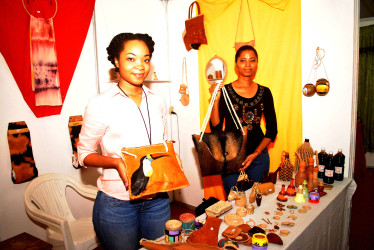For Samantha Corlette, entry into the world of business was a matter of opportunity rather than considered choice. She owns a modest craft shop called Treasure Box, run from Triumph on the East Coast Demerara specializing in the production of items made from bamboo and leather.
The Treasure Box is one of a number of emerging businesses in the craft sector that put in an appearance at last month’s Business Exposition, a display and marketing forum staged by the Ministry of Business to facilitate the small business sector.
Corlette was upbeat about being at the Business Expo. It was a debut event for her. She had gone to Sophia, she said, “with an open mind” and at the end of the day was satisfied with the outcomes in terms of both sales and product promotion, though she, like others, told Stabroek Business that the crowds appeared to have stayed away.

Not that Corlette was complaining. The absence of the crowds and the music, she says, had allowed for far more exchange between vendors and visitors to the event so that the possibilities of follow-up interaction leading to market-creation were now greater. More than that, Corlette said, the absence of the bigger players from the event had allowed for a leveler playing field.
Bamboo is Corlette’s primary raw material. Her skills, however, allow her to work with straw and leather as well. Her skills at dyeing add another touch to her products.
At the Business Expo her stall boasted an eye-catching display that offered items including evening purses made from coconut shell, bamboo and goat skin; fruit, clothing, plants, decorative baskets, bamboo decorations, leather slippers, jewellery made from straw and tissue holders among others.
She has no formal business training though she comes across as an instinctive businesswoman, someone who understands the uncertainties of commerce and who can spot an opportunity a mile away.
Pricing, she says, can sometimes be “an issue.” There have been queries regarding why the asking price for her own bamboo baskets is $4000, whilst similar-looking straw baskets made by Amerindian weavers are cheaper. The simple truth is that bamboo can be costlier and is certainly more challenging to work with. However, in circumstances where the market preference is for the Amerindian product she has had to adjust her prices on the bamboo baskets and lower the volume of production.
Among the stylish dressers, however, bamboo products offer a niche market and Corlette seeks to exploit that market. There are some customers who want to be different and they will purchase.
Guyana Stores and Craft Creations are amongst her main regular outlets. People searching for gifts tend to find their way to those stores. Sales, she says, are seasonal. Whenever culture-based events come around sales increase.
While she wishes she could rent premises of her own, she knows that the local market is still some distance from that point where craft can pay the bills associated with a downtown store. Until she can move on, she operates from her parents’ home at Plaisance on the East Cast Demerara. There are occasions when collection of orders from her are done at her sister’s business premises, Simple City at 176 Waterloo Street, North Cummingsburg.
Corlette still holds a full-time job and declines to speculate on when she would go off on her own.
After she completed secondary school and was in the process of contemplating a career path, she enrolled at the Sophia Training Centre. Under the tutelage of Ms Marjorie Simmons she learnt the skills of straw craft, graduating at the top of her class.
Subsequently, the then ministry of tourism, industry and commerce hosted a group of visiting Chinese who were curious about the history of Chinese in Guyana and their connection with the bamboo growing here. Arising out of that visit the Chinese began to share their skills in bamboo craft with locals, a development that provided another opportunity for Samantha. Apart from sharing their skills the Chinese trainers left behind various pieces of equipment for use in the bamboo craft industry.
It was after Samantha had taken advantage of these courses that she established the Treasure Box.
Her bamboo supplies are harvested from Supply on the East Bank Demerara, from a plot of land owned by a relative. The saving associated with not having to pay for the bamboo is considerable. Her leather purchases are made from a vendor on the Merriman’s Mall and her tibirsiri from persons who market the product in the city.
If she is to get the best out of bamboo the poles must be between five and seven years old. After harvesting they are cleaned then cut into pieces. Holes are made in the pieces. They are then boiled in a chemical for about hour, after which they are left for a day. The boiling process facilitates the removal of the green colour after which the pieces are stripped and cut in lengths suitable for the various products that will be fashioned from them. Preoccupied with her full-time job, production of her bamboo products is often slow and painstaking. For the moment at least she cannot contemplate hiring help. Skills are scarce and so, she said, are funds to meet the cost of wages. What she is hoping is that the beauty and uniqueness of her products will cause her customers to be patient with her.




